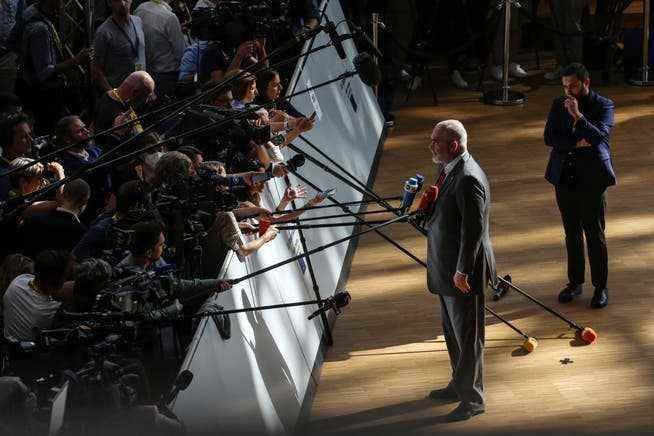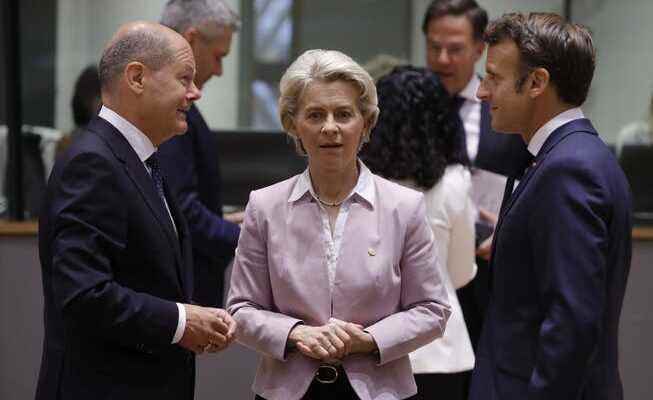The European Council names Ukraine a candidate for EU membership – even as Russia’s ongoing war raises questions about whether the country will last long enough to ever join the club.
German Chancellor Olaf Scholz, Commission President Ursula von der Leyen and French President Emmanuel Macron at the EU leaders’ meeting on Thursday.
Albanian Prime Minister Edi Rama won the prize for the most original description of the European Union on Thursday. “A gathering of priests discussing the sex of angels while the walls of Constantinople are collapsing” came to mind when the man stepped in frustration in front of a microphone in the EU Council building in Brussels.
Rama made no secret of his disappointment that there had been no positive surprises for his country. A top-level meeting of the 27 EU member states and the six Western Balkan countries Albania, Bosnia-Herzegovina, Kosovo, Montenegro, North Macedonia and Serbia had previously ended without any result. And that, although “historical decisions” should actually be made on this day, as it was called.
“Only nice words”
However, this promise only applied to Ukraine and Moldova, two countries that were to be declared candidate countries at the Brussels summit. For the countries of the Western Balkans, as Rama sarcastically wrote on Twitter, there should be “only beautiful words and beautiful pictures of beautiful people in a beautiful place”.
“I can only express my deepest regrets to the European Union,” the Albanian said as he opened a press conference with North Macedonian Prime Minister Dimitar Kovacevski and Serbian President Aleksandar Vucic. “Not even a war in Europe, which could turn into a global catastrophe, was able to bring about their unity.”
In fact, the EU-Western Balkans summit as a prelude to the regular EU summit on Thursday should have signaled a departure. For countries like North Macedonia and Albania, which have been waiting for admission to the international community for almost 20 years, there should have been a “credible promise of accession”. At least that’s what German Chancellor Olaf Scholz said in advance.
But this promise did not materialize. Mainly because the EU country Bulgaria continues to block the start of negotiations with North Macedonia. Sofia would like the small neighboring country to respond to Bulgarian wishes with regard to its history and language. And so, because the applications of the two countries are linked, the accession process with Albania cannot continue.
Rama called it a “shame” that one NATO country has two others
could take NATO countries hostage. However, even before the summit, it was clear how bad the mood was. Because of the Bulgarian veto threat, the heads of government of Serbia, Albania and North Macedonia had kept a summit boycott open until Wednesday – but then decided against it.

Albanian Prime Minister Edi Rama is deeply disappointed in the EU. His country has been in the accession queue for many years.
From EU circles it was said on Thursday that work was being done with the utmost urgency to solve the problems. The politically confused situation in Bulgaria doesn’t make things any easier. Parliament there had mistrust in Prime Minister Kiril Petkov and his pro-Western government on Wednesday evening
pronounced – not least because he wanted to give in in the dispute with North Macedonia.
Cheers in Kyiv
While the enlargement process with the Western Balkans falters, Ukraine can celebrate. As was widely expected, the heads of state and government voted on Thursday evening to officially include Kyiv in the group of candidate countries. In addition, it was decided to grant Moldova the status of a candidate country. With the step, the efforts of the two countries are wanted
recognizing the prospect of joining the EU, it was said in Brussels, and encouraging them. The Ukrainian President Volodymyr Zelensky in particular had recently repeatedly called for such a message from the EU –
also to show the more than 40 million citizens of his country
that the fight for freedom and democracy is worthwhile.
On Thursday evening, Selenski described the decision as a “historic moment”. “The future of Ukraine lies in the EU,” he wrote on Twitter.
However, the candidate status does not offer a guarantee of speedy admission to the EU. The heads of state and government know that the step is primarily symbolic and that the start of accession negotiations is linked to sweeping reforms in the areas of anti-corruption, the market economy and the rule of law. In truth, according to an EU official, no one can say whether Ukraine will ever become a member. The question is whether, in view of the ongoing war, the country will even exist long enough to join the club.
Selenski submitted the application for membership just a few days after the start of the
sent during a Russian attack. Shortly thereafter, Moldova and Georgia also submitted applications for membership. In the case of Georgia, the EU has decided not to grant candidate status until the country meets further reform requirements.
